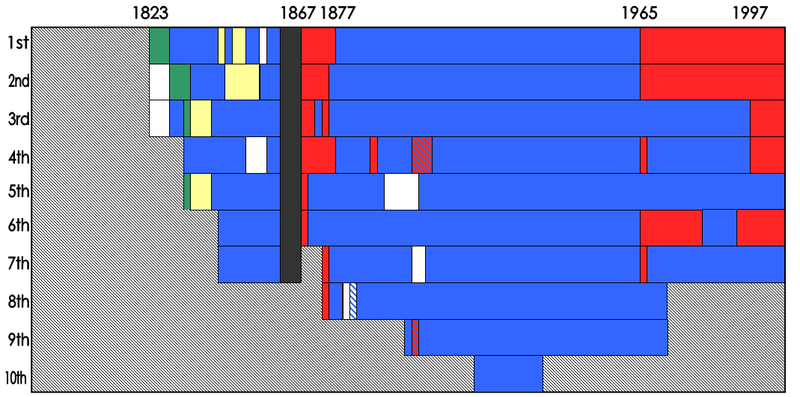
MONTGOMERY, Ala. — Illegal immigration could cost Alabama a congressional seat, according to a state representative who led the Yellowhammer State’s most recent reapportionment process.
According to the Alabama Legislature, reapportionment is “the process of redividing the 435 seats of the United States House of Representatives, based upon each state’s proportion of the national population. The preceding decennial census is the baseline for determining how many House seats are allotted to each state. The total number of each state’s U. S. House seats, combined with its two U.S. Senate seats, constitutes that state’s number of electoral votes in presidential elections.”
Alabama has held as many as 10 congressional districts, but has maintained seven since the mid 1960s. The 2010 U.S. census resulted in changes to the district lines that went into effect this year, but the state once again held onto its seven congressional seats.
Here’s a diagrammatic history of the Alabama House Delegation from 2006. The 5th District has since then flipped Republican.
But according to a new Election Data Services study cited by Pew Research, current population trends suggest Alabama could lose a congressional seat after the next census is conducted in 2020, and thereby also lose a vote in the electoral college.
Alabama grew 1.5% between 2010 and 2013, placing the state toward the lower end of the growth chart. With the exception of neighboring Mississippi (0.9% growth), no state in the South grew at a slower rate. The population of Texas, by contrast, soared by 7.2% over that same time period. The Northeast, which has long been a population center of the country, has experienced swift outward migration in recent years, even seeing some states actually lose population. But on the West coast, states are growing at a rapid pace, in many cases faster than can be explained by the country’s internal migration trends alone.
Alabama State Rep. Micky Hammon (R-Decatur), the legislator who spearheaded Alabama’s most recent reapportionment plan, has an explanation for why that is, and how it will impact Alabama.
“We have seen this national trend for the last 20 years,” Hammon told Yellowhammer. “Other states have lost Congressional seats to the Western states because of illegal immigration in the past. It has not effected us yet so it was not a big story in this area. This is a part of the liberal’s illegal immigration plan and the Republicans in Washington have been talking about this for some time. There is a political power shift to the states that embrace illegal immigration. Illegal immigrants cannot vote but are counted in the census. Congressional seats are not based on legal residents, but on the number of people who live there. This effects the number of electoral votes for president as well because they are based on the number of Congressional seats plus the two Senate seats.”
According to the Election Data Services research, here are the states who appear to be poised to gain and lose congressional districts after the next census:
States projected to gain districts:
Arizona +1 (from 9 to 10)
California +1 (from 53 to 54)
Colorado +1 (from 7 to 8)
Florida +1 (from 27 to 28)
North Carolina +1 (from 13 to 14)
Oregon +1 (from 5 to 6)
Texas +3 (from 36 to 39)
Virginia +1 (from 11 to 12)
States projected to lose districts:
Alabama -1 (from 7 to 6)
Illinois -1 (from 18 to 17)
Michigan -1 (from 14 to 13)
Minnesota -1 (from 8 to 7)
New York -1 (from 27 to 26)
Ohio -1 (from 16 to 15)
Pennsylvania -1 (from 18 to 17)
Rhode Island -1 (from 2 to 1)
West Virginia -1 (from 3 to 2)
Like this article? Follow me on Twitter and let me know what you think.
— Cliff Sims (@Cliff_Sims) December 3, 2014













